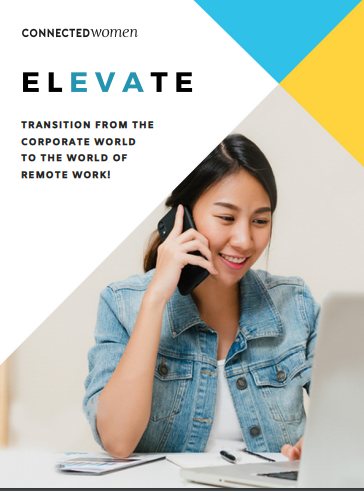Am I Qualified to Be An Online Remote Worker?
 Contributed by
Jen Cajucom
July 24, 2019
Contributed by
Jen Cajucom
July 24, 2019

You’re probably in the same stage in your life right now, asking the same question, as I did when I learned that it was possible to work from home.
It was in 2008 when I left the BPO industry and started working from home. Years before I left though, I was already keen on working remotely by telecommuting. I remember watching “The Net” during the late 90s where Sandra Bullock played the role of a software engineer and works by telecommuting. She saves her work on a 3.5 floppy disk then sends it off via Fedex. I remember telling my movie companion back then, “I wanna work like that, too!” Good times.
During the last quarter of 2008, I decided to pour all my time and energy into making this work-from-home setup a reality for me. I remember not having a piece of furniture back then. I bought a 2nd hand desktop from Gilmore with a faulty CRT monitor that sits on top of a Balikbayan box. I would hear the tapping of my fingers on the keyboard echoing in my empty abode, as I spend long hours sprucing up my CV. I took online tests, as I felt there was nothing I could showcase, except uploaded info on past traditional work experience. I also curated an appealing cover letter, which I eventually realized should be treated as a business proposal and not an application letter. The works.
Every single day, I would spend at least 4 hours just applying for online jobs on oDesk (now Upwork). From time to time, I would still receive phone calls from BPO companies who found my resume on Jobstreet, asking me if I was available for a job interview, and I could only tell them I wasn’t actively looking for a (traditional) job.
A large part of the energy that I put into my work from home formula was guesswork. Try this, tweak that, then rule out if it doesn’t work. There wasn’t a single online Filipino community back then that provided support for my kind of journey. I relied on Google and Youtube, which didn’t have as much resources on what I was looking for back then. Sure, the information was there but I had to create my own roadmap to make the telecommuting setup work for me.
After almost 3 weeks of applying and receiving rejections, I finally landed my first client. He gave me a data entry project. I didn’t argue with the low hourly rate because I needed to get my first 5-star client rating.
It was the advice then of many – mostly from bloggers who shared their online remote work journey. They said almost the same thing: Weed out your corporate experience. Learn new skills. Start at the bottom to gain experience. Bag that 5-star feedback.
Was I qualified to begin with?
I had to find a way to make myself qualified.
Fast forward today, if I were to share the lessons I learned from my transitional journey to a fellow ex-corporate employee, it would be these:
1. Know what you’re good at.
The skills that you have acquired over the years can actually help you get your foot at the door of online opportunities. Better yet, it could even be your niche in the long run. Think about this: With a lot of companies and businesses now outsourcing almost their every office department to save on cost (and space) – be it sales, customer service, marketing, accounting, etc. – it’s sometimes just a matter of asking yourself a few questions, “What department was I a part of?”, “What did I do back then?”, “Was I good at it?” Your answers to these questions help you position yourself by aligning your skills to the current need. As the work is online, you can just upgrade and learn online tools related to the skills that you’re good at.
2. Know who you want to work with.
Who’s your ideal client? It could be a tough question to answer, but think about this: “What kind of client would have a great need for your skill set?”
3. To weed out means “to tailor fit”.
I just realized this after digesting online content that suggested to weed out the unnecessary. This is essentially in conjunction with no. 2. Once you’ve identified who your ideal client is, it’s time tailor fit your online profile to that ideal client’s requirements. If you have experience in customer service and you love doing customer service work, then show that in your profile – from your work experience, to your online tests, to your list of training and certifications (a plus, but often not required), etc.
4. Create a personal brand and bring it online.
Creating a personal brand has its mutual benefits – both for you and your ideal client. Your personal brand not only helps in establishing yourself as someone who’s really good at what you do, your target clients, likewise, find it easier to know that what you can do for them is something that they exactly need.
5. Search for job matching platforms or agencies that can help you find the right client for you.
Platforms like Connected Women and online VA agencies make it a win-win for both the client and online worker. They make sure they have processes that really involves matching the perfect worker to the client. It’s win-win for both, if you think about it.
There are still a ton of other tips that I’m sure others who’ve had the same journey can share, but these are the ones that I think can help you jumpstart your online career.
And just to wrap it up, let me just end this with a simple reminder: “Know your worth and what you can do, then find that person who can value your worth.”
Sounds like a love story eh, but you get the message 😉
—
Jen Cajucom is an online professional for 11 years. An expert in working remotely, Jen is one of #ConnectedWomen’s first batch of ELEVATE program trainers. The program is designed to help women transition from traditional corporate jobs to remote work.
Are you thinking of transitioning into online work?
Interested in joining a brand new training program with Jen and other Connected Women expert trainers?
Check out Connected Women’s ELEVATE











Sorry, the comment form is closed at this time.